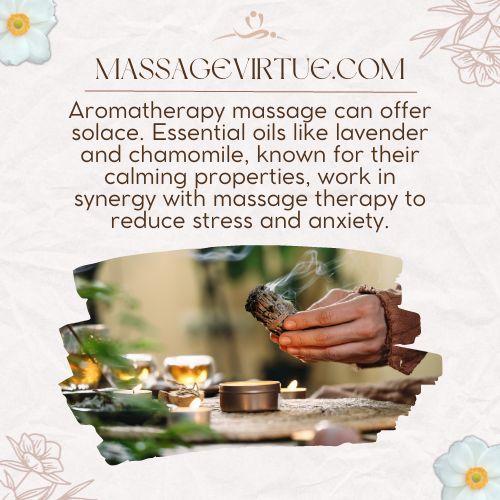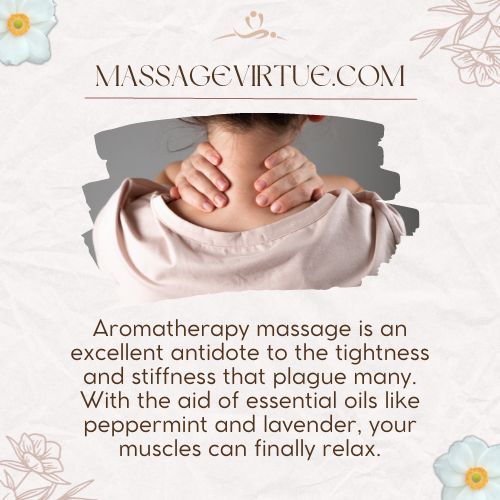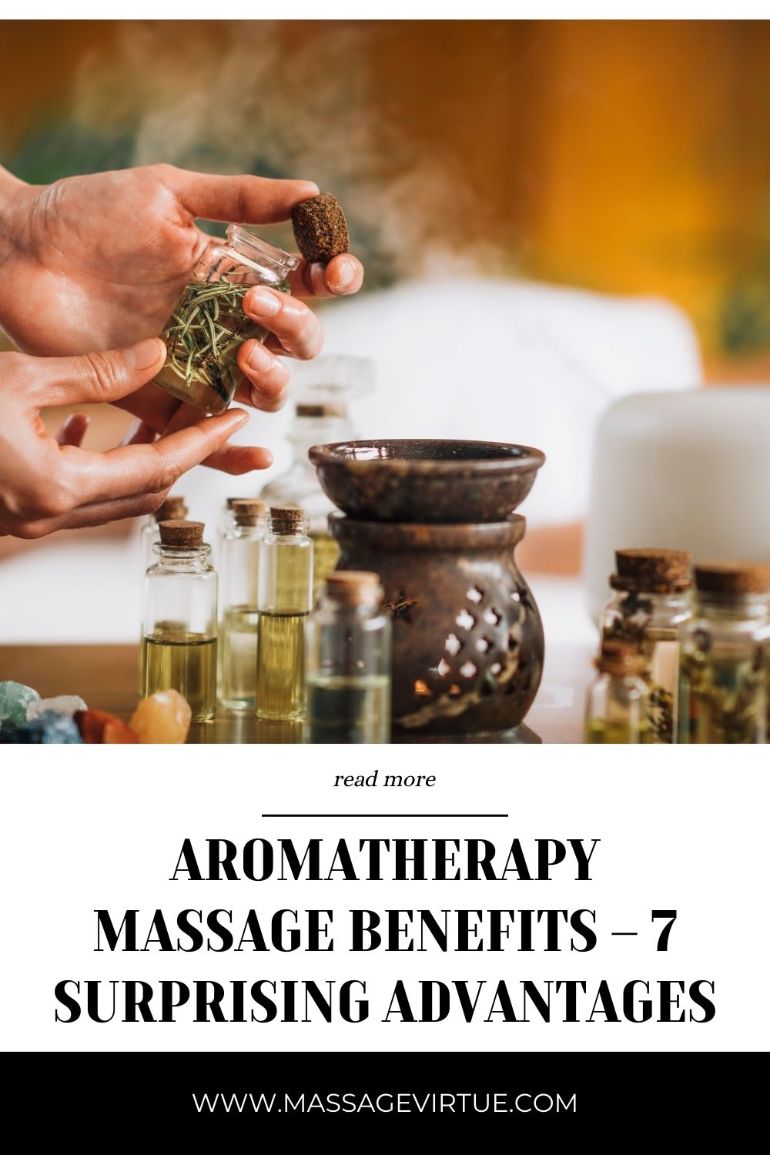Are you looking for a natural and holistic way to enhance your well-being and reduce stress?
Aromatherapy massage might be the answer you’ve been searching for. In this article, we’ll delve into the incredible world of aromatherapy massage benefits, exploring how this ancient practice can positively impact your life.
So, sit back, relax, and let’s journey through the soothing world of essential oils and massage therapy.
Aromatherapy Massage Benefits
Aromatherapy massage offers various benefits for your physical and mental health. Let’s have a closer look at some of them:
1. Stress Relief
When the weight of the world feels heavy on your shoulders, aromatherapy massage can offer solace.

Essential oils like lavender and chamomile, known for their calming properties, work in synergy with massage therapy to reduce stress and anxiety.
During a session, the gentle strokes release endorphins, those feel-good hormones that lift your spirits.
2. Anxiety Relief
Anxiety can be paralyzing, but aromatherapy massage can help you find your calm. Whether you’re grappling with a generalized anxiety disorder or social anxiety disorder, essential oils such as lavender and bergamot can be your allies.
These oils have the remarkable ability to soothe both your mind and body, offering respite from the whirlwind of anxious thoughts.
3. Pain Relief
Chronic pain can be a formidable adversary, but aromatherapy massage can provide relief.
For those plagued by headaches, muscle aches, or arthritis pain, essential oils like peppermint and ginger come to the rescue.
Their anti-inflammatory and pain-relieving properties work harmoniously with massage, alleviating discomfort.
4. Sleep Improvement
In a world filled with distractions, quality sleep is a precious commodity.
Aromatherapy massage can pave the way to dreamland by inducing relaxation and reducing stress.
The enchanting scents of lavender and chamomile have proven their efficacy in improving sleep quality, letting you wake up refreshed and rejuvenated.
5. Muscle Tension Relief
If you carry tension in your muscles, you’re not alone. Aromatherapy massage is an excellent antidote to the tightness and stiffness that plague many.

With the aid of essential oils like peppermint and lavender, your muscles can finally relax.
These oils have the power to soothe and reduce inflammation, giving your body the relief it craves.
6. Headache Relief
Whether it’s a throbbing migraine or a tension headache, the pain can be excruciating.
Aromatherapy massage, featuring the soothing scents of peppermint and lavender, can bring welcome relief.
These oils possess remarkable pain-relieving and anti-inflammatory properties, helping you find relief without resorting to medication.
7. Depression Relief
Depression can cast a long shadow over your life, but aromatherapy massage can offer a glimmer of hope.
Essential oils like bergamot and lavender, with their mood-boosting and anti-depressant properties, can be valuable companions on your journey towards healing.
Aromatherapy massage can uplift your spirits and provide moments of respite from the darkness.
Aftercare for Aromatherapy Massage
After indulging in the bliss of aromatherapy massage, it’s essential to care for yourself. Here are some aftercare tips to maximize the benefits:
- Stay Hydrated: Drink plenty of water to flush out toxins and stay hydrated.
- Rest: Allow your body to rest and recover; avoid strenuous activities.
- Avoid Alcohol and Caffeine: These substances can negate the calming effects of aromatherapy massage.
- Continue Self-Care: Incorporate self-care practices into your routine to maintain your well-being.
- Regular Sessions: Consider making aromatherapy massage a regular part of your wellness regimen to experience consistent benefits.
Aromatherapy Massage Techniques
| Technique | Description |
| Effleurage | Long, gentle strokes to warm up and relax muscles, are often used at the beginning and end of a massage. |
| Petrissage | Kneading and squeezing of muscles to reduce tension, improve circulation, and promote relaxation. |
| Friction | Deep circular movements target knots and adhesions, aiding in muscle relaxation and pain relief. |
| Tapotement | Rhythmic tapping or patting invigorates muscles, improves blood flow, and energizes the body. |
| Pressure Points | Focused pressure on specific points to alleviate pain, and tension, and promote holistic well-being. |
Conclusion
In a world that often feels fast-paced and overwhelming, aromatherapy massage offers a gentle retreat.
The benefits of stress relief, anxiety reduction, pain alleviation, improved sleep, muscle tension relief, headache management, and depression support are truly remarkable.
By embracing the power of essential oils and skilled massage therapy, you can embark on a path toward greater well-being and healing. Give yourself the gift of aromatherapy massage and discover the profound impact it can have on your life.
FAQs
What Does Aromatherapy Massage Do?
Aromatherapy massage combines the soothing power of massage therapy with the aromatic benefits of essential oils. It helps reduce stress, anxiety, pain, and muscle tension.
It can also improve sleep quality, relieve headaches, and even aid in managing depression.
What Does a Full Body Aromatherapy Massage Include?
A full-body aromatherapy massage involves massaging the entire body using a blend of essential oils. It typically includes gentle strokes, kneading, and pressure on muscles.
The therapist customizes the oil blend to your needs, ensuring a relaxing and rejuvenating experience.
Are Aromatherapy Massages Worth It?
Yes, aromatherapy massages are worth it if you seek relaxation and relief from stress, pain, or tension. They offer both physical and mental benefits, promoting well-being and a sense of calm.
However, the value can vary from person to person, so it’s essential to consider your specific needs and preferences.
How Often Should You Have Aromatherapy Massage?
For regular stress relief and well-being, monthly sessions can be beneficial.
If you’re dealing with chronic pain or specific issues, more frequent sessions might be needed, but it’s best to consult with a therapist to determine the ideal frequency for your unique situation.


